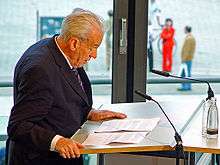Walter Jens
| Walter Jens | |
|---|---|
 Jens addressing the Academy of Arts, Berlin (2005) | |
| Born |
March 8, 1923 Hamburg |
| Died | June 9, 2013 (aged 90) |
| Occupation | Professor, philologist, writer |
Walter Jens (8 March 1923 – 9 June 2013) was a German philologist, literature historian, critic, university professor and writer.[1]
He was born in Hamburg, and attended the Gelehrtenschule des Johanneums from 1933 to 1941, when he gained his abitur, before studying at the University of Hamburg.[2] In the early 1940s, Jens joined the NSDAP. He denied having applied for membership actively and claims that he had become a member automatically because he was a member of the Hitler Youth and that he never received a membership card. During World War II, he earned a doctorate in Freiburg with a work about Sophocles' tragedy and habilitated at age 26 with the work Tacitus und die Freiheit (Tacitus and Freedom) at the Eberhard Karls University of Tübingen. Jens was a member of the Turnerschaft Akademischer Turnbund.
From 1950 on, Jens was a member of the Group 47. That year, he had his breakthrough with the novel Nein. Die Welt der Angeklagten. One distinguishing characteristic of his literary work is that he interprets current events by looking back at the past.
From 1965 to 1988, Jens held the chair for General Rhetoric at the Eberhard Karls University of Tübingen, which was created in order to keep him at the university. Under the pseudonym Momos, he wrote television reviews for Die Zeit. From 1976 to 1982, he was president of the International PEN center in Germany. From 1989 to 1997, he was president of the Academy of Arts, Berlin, and afterwards he was the honorary president. From 1990 to 1995, he was chairman of the Martin-Niemöller-Foundation.
Jens suffered from dementia, which began to manifest in 2004. He died in 2013 in Tübingen.
Honours and awards
From 1961 to 1993 member of the Academy of Arts, Berlin (West), Section literature. From 1986 to 1990 corresponding member of the Academy of Arts, Berlin (East), Department of Literature and Language Maintenance. From 1990 to 1993 Ordinary Member of the Academy of Arts, Berlin (East), Section Literature and Language Maintenance. Since 1993 member of the Academy of Arts in Berlin, Literature section. Member of PEN, the German Academy for Language and Literature, Darmstadt, the Free Academy of the Arts, Hamburg, and the German Academy of Performing Arts, Frankfurt am Main. Honorary doctorates from the University of Stockholm, the Friedrich Schiller University of Jena and the University of Hamburg.
- 1951: Prize of Amis de la Liberté
- 1959: German Youth Literature Prize
- 1968: Lessing Prize of the Free and Hanseatic City of Hamburg
- 1981: Heinrich Heine Prize of the city of Düsseldorf
- 1982: Honorary President of the PEN Centre of the Federal Republic of Germany
- 1983: Austrian Merit
- 1984: Adolf Grimme Award
- 1988: Alternative Büchner Prize
- 1988: Theodor Heuss Prize (with Inge Jens)
- 1989: Hermann Sinsheimer Award
- 1990: Austrian State Prize for Cultural Journalism
- 1992: Austrian Decoration for Science and Art
- 1992: Poetry Foundation Visiting Professor at the Goethe University, Frankfurt am Main
- 1997: Bruno Snell sticker for outstanding work in science and society at the University of Hamburg
- 1997: Honorary President of the Berlin University of the Arts
- 1998 Ernst-Reuter-Medal
- 2002: Ecumenical Sermon Prize (Predigtpreis) awarded by German publisher Verlags für die Deutsche Wirtschaft
- 2003: Grand Merit Cross of the Order of Merit of the Federal Republic of Germany
- 2003: Corine Literature Prize (with his wife Inge Jens)
References
- ↑ "German writer and intellectual Walter Jens dies | News | DW.DE | 10.06.2013". DW.DE. Retrieved 2013-06-11.
- ↑ "Biografie - Walter Jens". Who's Who. Retrieved 2016-02-21.
External links
| Wikimedia Commons has media related to Walter Jens. |
Walter Jens in the German National Library catalogue